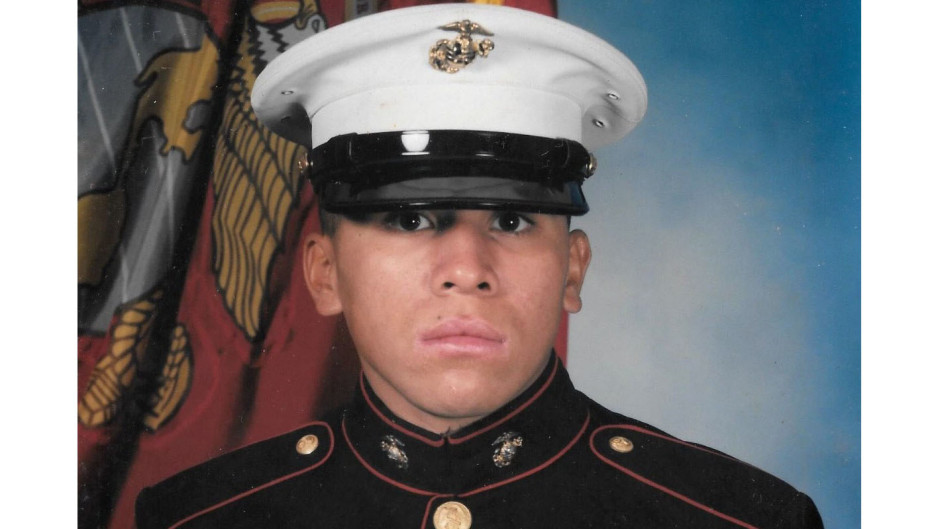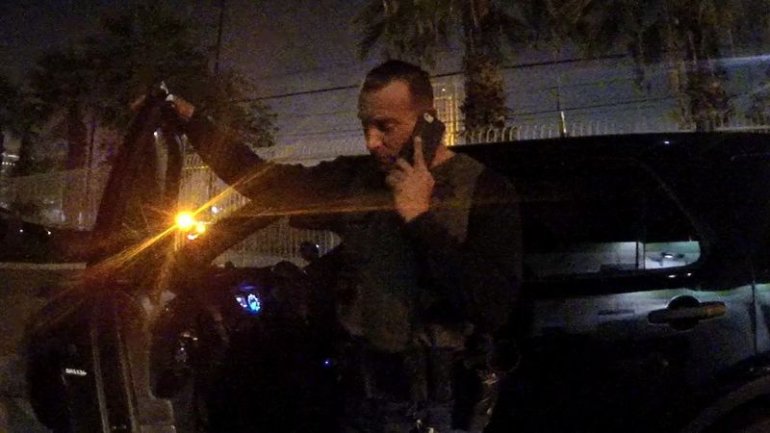The Long Beach resident, who saw combat in Iraq, served time for felonies. His supporters are asking Gov. Newsom for a pardon.
A large tattoo of the Statue of Liberty is spread across the left side of Jose Segovia Benitez’s body. A second tattoo memorializes his service to the U.S. Marines.
Neither will serve him well in El Salvador.
But that’s where the honorably discharged veteran from Long Beach is apparently headed, as the U.S. government readies to deport him in the next few days.
Benitez faces imminent deportation, according to a team of supporters who have been fighting for his release from an immigrant detention center in San Bernardino County. Immigration officials have told him he will be in El Salvador, a country he left when he was 3 years old, by next Wednesday. They’ve already secured him a visa.
“His mother is packing his bag,” said Pat Alviso, national coordinator for Military Families Speak Out, an organization that advocates for returning troops from the Middle East and supports ending the deportation of U.S. veterans.
RELATED: Immigrants who have served in the U.S. military are being deported after facing legal troubles
Segovia served five years in the military – tacking on an extra year to return to Iraq for a second combat tour. But he wasn’t the same when he returned home in 2004 with a brain injury and post-traumatic stress disorder. He committed several felonies and served time in prison for drug and domestic violence offenses. A legal permanent resident when he joined the Marines, immigration agents picked him up in January 2018 after he completed his last prison term.
Now 38, he’s been at the Adelanto ICE Processing Center ever since, awaiting possible deportation while his case went through a series of legal maneuverings. Last month, the Ninth Circuit Court of Appeals ruled against a request to stay his deportation.
His supporters are hoping for a Hail Mary – possibly via a pardon from the governor. The country owes him as much, they said.
“Here is someone this country is supposed to revere as a hero,” said Brandee Dudzic, an Oregon resident who heads a group called Repatriate our Patriots, which advocates for returning deported U.S. veterans to America.
“If Jose had died over there, we would all be talking about Jose the American soldier who was willing to give his life for his country. He didn’t die. He just got hurt,” Dudzic said Friday.
“At some point, he was the American hero. But then he became a guy from El Salvador,” she said. “At what point did he lose his label?
“We dressed him up in our flag. At what point does that go away? I think it’s because he’s no longer useful. I think that’s the story of all deported vets. And then we can throw them away like garbage.”
His case is one of many – it’s unclear how many exactly – involving immigrant veterans booted from the country after serving in the military. Organizations representing deported veterans have documented hundreds of cases. In 2017, the Congressional Hispanic Caucus put the number closer to 3,000.
Segovia’s case is complicated but also representative of what some veterans face when they return home, his advocates said. He suffered a brain injury from close proximity to a blast while in Iraq but he did not receive proper treatment, they said. He turned to alcohol and “self-medicated,” his mother, Marta Garcia, said in an interview earlier this year. (She could not be reached this week.) That, in turn, led to trouble, which landed him in prison.
On Saturday, Oct. 12, his family planned to drive from its home in Long Beach to the Adelanto ICE Processing Center, where he has been detained for nearly two years.
They planned to say goodbye.
His mother, Long Beach resident Marta Garcia, may fly to El Salvador to meet him – just so that he’s not alone when he first arrives, Alviso said.

Dudzic, of the Repatriate our Patriots group, speaks with him daily and flies to Southern California regulary to visit. She filed a 522-page application seeking a pardon for him from California Gov. Gavin Newsom.
The governor’s office on Friday said it could not discuss pardon applications. Rep. Nanette Diaz Barragán (D-San Pedro) said through a spokesman that her office “has been in contact with the Governor’s office regarding his family’s request for a pardon.”
“Veterans who serve our country honorably should receive fastrack to citizenship and those in combat, should receive automatic citizenship,” Barragan wrote in an email.
His stint at the Adelanto prison has been difficult, relatives and friends said.
“He’s had a bizarre swelling in his leg, pain from not seeing a dentist and he’s developed a heart condition,” said Liza Diniakos, a Ventura County resident who first met him through a detainee visitation program through the non-profit Freedom for Immigrants group and continues to stay in touch.
In August, several national civil rights organizations – including Disability Rights Advocates and the Inland Coalition for Immigrant Justice – filed a class-action lawsuit against the U.S. Immigration and Customs Enforcement (ICE) and others, alleging that immigrants are not receiving proper medical and mental health care at its facilities. Segovia was one of 15 plaintiffs cited in the lawsuit.
Dudzic said she’s seen him deteriorate all year.
“It’s taken an extreme toll on him, mentally, physically,” she said. “This is what it looks like to be tortured.”
“We have a disabled combat veteran with a traumatic brain injury in a facility that puts people in isolation and pepper sprays them,” Dudzic said of the controversial Adelanto facility, which has also been criticized by state and federal officials in recent years.
Segovia’s attorney, Wayne Spindler of Encino, said there may be other legal action available but that won’t necessarily prevent the government from deporting Segovia.
Ironically, Segovia, who was brought to the U.S. as a child, filed for citizenship while he was still serving in the Marines. The government bungled that application, Spindler said. Spindler and others believe the Marine was scheduled for an interview, which is the last step of the process before the naturalization ceremony, but did not make it there.
“Even today, his application for citizenship has not been denied,” Dudzic said. “It’s been administratively closed and should be reopened.”
Like his family and other supporters, Dudzic said she worries for Segovia. On Friday, she also was looking for airline tickets to possibly meet him in El Salvador.
His tattoos alone could make him a high profile target among violent gang members, she said.
Segovia’s patriotism, so far, has not served him well.




